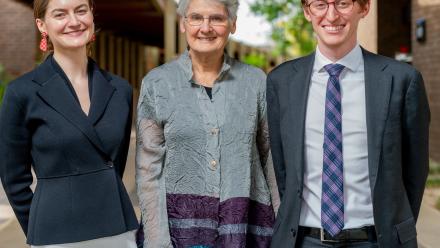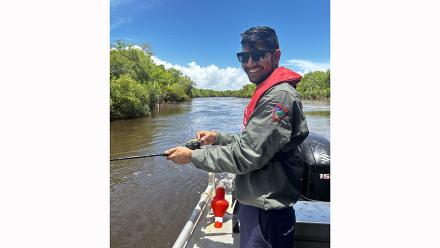Where students share their bright business ideas
A bioplastic made from coffee grounds and an app providing peer-to-peer tutor matching were the business ideas that topped the latest round of the InnovationACT (IACT) entrepreneurship program.
Delivered in collaboration with the Canberra Innovation Network (CBRIN), this round of IACT included 72 students and 23 teams, including four teams of ANU PhD students.
Joint winners of the two-week online intensive, ChalkUp and CoffeeKii, have each been making headway with their shared prize fund of $5,000.
Irene Zhen, Innovation Program Manager at CBRIN, said the inclusion of research students was successful from a commercialisation standpoint.
"We saw ideas that were more fully formed and based on their research, which is exciting," she said.
"There's a lot of unique knowledge that can be translated to a commercial service, and it's great seeing these people engage in the process and learn how they can create impact."
ANU is working to encourage more entrepreneurship within the university, said Associate Director (Acting), New Ventures & Entrepreneurship at ANU, Dr Elaine Stead.
"With academics there's a focus on spinouts, but it's not enough to just have a framework that supports academic entrepreneurship. We need to extend this across the whole spectrum," she said.
For PhD students Ashwani Kumar and Brett Pollard of CoffeeKii, both studying polymer chemistry at the ANU School of Chemistry, the mentoring process through IACT helped evolve their business idea.
"We went in to the program thinking of selling phone cases made from the bioplastic we created out of coffee grounds," he said.
"The big turnaround for us was the feedback that phone cases are less than a dime a dozen, but if we could sell the material, either licence it to a bigger distributor or market it directly, we could have a wider scope.
"So even starting to think in that way was incredible for us."
The IACT teams are evaluated on whether they have a sense of what the first commercial application should be, said Dr Stead.
"We look at whether the teams have done the work to speak to potential customers, whether there's a product market fit, what's their go-to-market strategy, and how well they pitched it," she said.
"This process is very different how you go about conceiving of and validating an idea for a business.
"It's not something that most research scientists get taught in their courses. It's a different skillset and the earlier we can teach it to students who are inclined to go down that route, the better."
Joint winners ChalkUp, run by undergraduate students Tim Muya and Vishaal Varma, created a mobile app called Chalkie, which provides peer-to-peer tutor matching and organisation tools for time tabling, degree planning and grade forecasting.
"The most beneficial thing in IACT for us was the realisation that if you have an idea, you can dream big and implement it," said Tim, who's studying a Bachelor of Economics.
"We realised that we did not have to have all the solutions upfront and that attempting (and failing) at building valuable solutions and products can start with little resources and achieve big results."
Tim and Vishaal said that a key learning point for them was realising that feedback was crucial in order to grow the business.
"The hardest part was confronting customers about our idea," said Vishaal, who's studying a double degree in Finance and Science (Psychology).
"Anyone developing a business product will tell you it's like having a child - you care deeply for it, and it can be hard for you to see people reject, dismiss or dislike our 'baby'."
ChalkUp is now investing in hiring developers to make an MVP mobile application to launch in the near future.
"This will be the first step in getting the product to market," said Vishaal.
"We've added more features to our prototype since the end of the competition and consulted with software developers on the design and other alterations required to create the MVP.
"As non-technical people, we have had to learn a lot about computer science and programming to communicate with developers to make sure our designs are achievable and what we envisioned."
Since the end of the program, CoffeeKii's Brett and Ashwani said they're looking to get more materials and equipment to increase the consistency of manufacturing, and patenting the method they use.
"Once we have the characterisation down and a patent draft, we'll look at partnerships," Ashwani said.
"It's a great product and a green process, so if it could scale up and have an impact, it would be wonderful."
"Seeing the infinite number of pathways open to us was so helpful," said Brett.
"Taking a product from conception to dialling in to what different experts would see as the best path - that was super valuable. We work in a lab, not in boardrooms, so it was great to get that sort of vision."
Part of the goal of the university is to do impactful research that can translate to the greater good, said Dr Stead.
"Getting people to think in a different way is the challenge."
ANU is a founding partner in CBRIN and the collaboration on IACT represents an exciting new initiative between the two organisations to provide real-world commercialisation experience to researchers and students.


